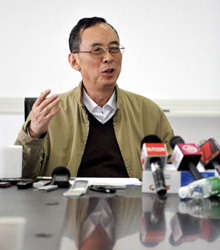| Education Reformer
 |
|
(XINHUA) |
Zhu Qingshi, President of South University of Science and Technology of China (SUSTC), has attracted attention of the public again as the university received approval from the Chinese Ministry of Education in April to recruit students.
Zhu, 66, former President of the University of Science and Technology of China (USTC), was appointed president of SUSTC in 2009.
A graduate from USTC in 1968, Zhu started research work at the Chinese Academy of Sciences (CAS) in 1974 and was sent to study abroad in 1979. He returned to China in 1982 and became an academician of the CAS in 1991. In 1994, Zhu started teaching and researching at USTC and became its president in June 1998. After retiring from the post in September 2008, Zhu was chosen as the president of SUSTC because of his efforts and spirit in reforming higher education in China, which is in line with the spirit of the new university.
Zhu holds that universities should recruit students and issue diplomas independently, which could be a direction of the education reform in China.
The China Securities Regulatory Commission (CSRC) issued new rules for the initial public offering (IPO) system.
The rules issued on April 28 are aimed at improving the accuracy of information disclosures and making initial pricing more reasonable, said the CSRC.
The new IPO rules detail separate responsibilities for issuers, intermediary institutions, law offices, accounting firms and rating agencies, as well as dictate strict punishments for infringement and illegal practices.
The CSRC promised to introduce independent third parties to carry out risk evaluations regarding information disclosures by companies in order to give references to medium- and small-sized investors.
When price earning ratios go 25 percent higher than their listed industry peers, issuers should further analyze possible risks in order to disclose more information to investors.
The CSRC said the new rule gives market participants time to consider whether their pricing is reasonable or not.
China's stock exchanges in Shanghai and Shenzhen on April 30 both said they will cut brokerage fees for A-share transactions by over 25 percent starting June 1 in a bid to alleviate investor burdens.
The brokerage fee at the Shanghai bourse will be lowered from 0.011 percent to 0.0087 percent of the trading volume. The Shenzhen bourse will lower the fee from 0.0122 percent to 0.0087 percent.
China Securities Depository and Clearing Corp. will also lower the registration fee for A-share transactions in the Shanghai bourse from 0.05 percent to 0.0375 percent of the trading volume.
It's estimated that the cuts in transaction fees will save investors about 3 billion yuan ($477.81 million) annually.
The cuts will markedly lower the transaction cost and investor burden, and thus contribute to the healthy development of the country's capital market.
China's purchasing managers index (PMI), a preliminary readout of manufacturing activities, rose in April for the fifth consecutive month.
The PMI climbed to 53.3 percent in April 2012, 0.2 percentage points higher than that of March, according to figures from the China Federation of Logistics and Purchasing (CFLP). A reading of 50 percent demarcates expansion from contraction.
"The continuous rebound of PMI shows that China's economic growth is stable," said Cai Jin, Vice Chairman of the CFLP.
China and South Korea on May 2 announced the beginning of negotiations for setting up a free trade area (FTA), according to a press conference attended by Chen Deming, Minister of Commerce, and Park Tae Ho, South Korean Trade Minister.
Chen said the first round of negotiations will be held in May, adding that he hopes the negotiations will be concluded within two years.
Park Tae Ho said the two countries will start by finalizing modalities for trade in goods, services, investment and other areas, which will be an integral part of the agreement.
Both ministers agreed that the level of liberalization for trade in goods and services should go beyond each country's commitment to the WTO.
Bilateral trade between the two countries has witnessed strong growth during the past two decades, with bilateral trade volume rising 18.6 percent year-on-year to $245.6 billion last year.
China has become South Korea's largest trading partner, while South Korea ranks as China's third largest trading partner.
Sinopec Group, China's top oil refiner, said it will buy a 25-percent stake in a nitrile butadiene rubber plant belonging to leading Russian petrochemical company Sibur.
Sinopec signed an agreement with Sibur on April 29 to expand the annual output capacity of the rubber plant in Krasnoyarsk to 56,000 tons from the current 42,000 tons.
It said the two firms plan to establish a joint venture at the end of this year.
An oil-resistant synthetic rubber, nitrile butadiene rubber is widely used in aeronautics and astronautics, as well as in the oil, petrochemical and textile industries.
On April 27, the first trading day of People's Daily's website, People.cn, on the Shanghai bourse, its shares surged 73.6 percent to 34.72 yuan ($5.51) per share.
The company started trading at 31.01 yuan ($4.92) per share on the Shanghai Stock Exchange, 55.05 percent higher than its initial public offering (IPO) price of 20 yuan ($3.17).
The IPO, which has attracted a great deal of market attention as it marks the first-ever listing of a state-owned media website, is expected to raise up to 1.38 billion yuan ($219.4 million) through the sale of 69.11 million shares on the Shanghai market.
The company's IPO prospectus showed the major source of the company's profits come from advertisements, and information and wireless services.
The company said it plans to use 527 million yuan ($83.65 million) from the IPO proceeds to improve its wireless services, make tech upgrades and bolster its editorial team. | 